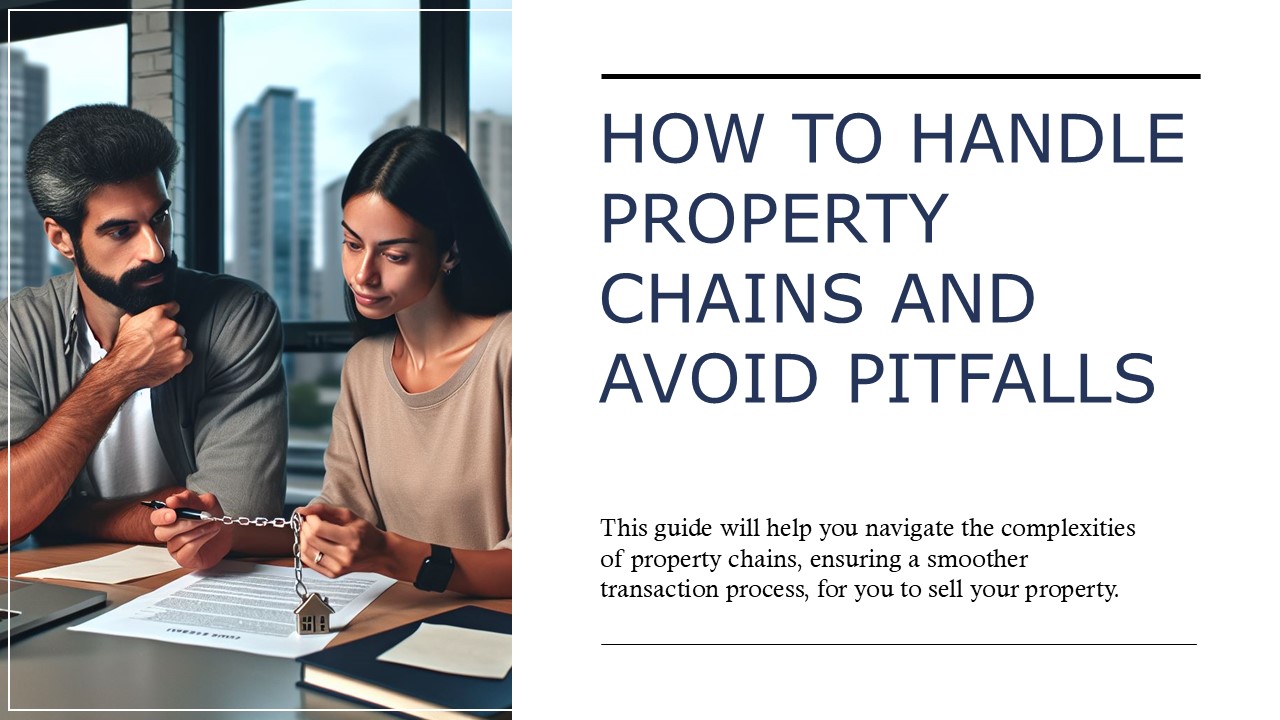What is a Property Chain?
A property chain occurs when multiple property transactions are dependent on each other. If you’re buying a property, the sellers of that home might be purchasing another property, and so on. This creates a ‘chain’ of buyers and sellers, where each transaction relies on the successful completion of the others.
Common issues with property chains include delays and breakdowns. Delays can happen due to mortgage approval processes, legal issues, or problems in other parts of the chain. A chain breakdown occurs when a buyer or seller pulls out of their transaction, causing a ripple effect that can collapse the entire chain.
When should I consider selling as part of a chain?
It’s important to understand the current status of your prospective buyers related sale. Your Estate Agent should be able to fully inform you of this as they will have ‘checked the chain’, ie spoken to the buyers Estate Agent and spoken with any further Estate Agents below them in the chain to find out exactly where every transaction is.
The possible status of the prospective buyer are thus:
- Property To Sell, Not On Market (PTS/NOM) - Ordinarily you would NOT agree a sale to a buyer in this status. The buyer needs to sell their home to be able to buy yours and not even having their property on the market does not show any true intentions to move whatsoever
- Property To Sell, On Markt (PTS/OM) – Again, it’s difficult to agree to sell to someone who has not yet got a buyer for their own home. They are on the market and presumably viewings are taking place, so a buyer could come along any day. If they make a particularly good offer and they are listed with the same agent, it may be worth offering them an exclusive period of 4 weeks or similar to find a buyer. Your mutual agent will give you a good idea of how realistic their asking price is
- Under offer (u/o) – Being under offer means that the buyer has agreed a sale for their own home and their sale is proceeding. You should be safe to proceed with this buyer. It’s worth checking with your bbuyer’s selling agent that their buyer has received their mortgage offer; thus eliminating any third parties (the bank) that could pull the plug. The further along the sale is the safer the transaction. Your Estate Agent will be able to give you a full run down of the status of their sale.
So long as your buyer is Under Offer and their chain is complete (ie, the party at the bottom is a first time buyer or similar with no related sale), then your sale will be able to proceed straight away. You can expect that the further down the chain you go the more advanced each sale will be, as they would have commenced earlier. Your solicitor should therefore immediately send out draft paperwork in order to allow your sale to catch up with the others below. This is also the point at which you as a seller can begin placing offers on properties to buy if that is the intention.
All transactions in the chain will have to exchange contracts on the same day and complete on the same day, so it’s important that all the Estate Agents are in communication to ensure transactions are proceeding at the same pace.
Managing a Property Chain
Choosing the right estate agent is crucial. An experienced agent can navigate the complexities of a property chain and manage potential issues efficiently. This is often called ‘sales progression’ within the industry. They can also keep all parties informed, helping to maintain momentum in the process.
Staying informed is essential. Regularly check the status of your property chain with your estate agent. Understanding where potential delays might occur allows you to address them promptly.
Your solicitor or conveyancer is not able to provide this service generally because they can only speak to you and the solicitor of the person you’re buying from. An estate agent has more flexibility than this and is therefore often able to give you far more information and support.
Flexible planning is vital. Be prepared for possible delays and have flexible moving plans. This might mean arranging temporary accommodation or being ready to adjust your moving dates if necessary.
Avoiding Chain Breaks
Financial preparedness is key to avoiding delays. Ensure your finances are in order, with mortgage approvals and funds ready. This reduces the risk of last-minute hitches that can delay or break the chain.
For the best local people to speak to in order to ensure all your number ducks are in a row, get in touch with us and we can put you in touch with the right people for your circumstances.
Effective communication between all parties involved in a chain is crucial. Keep in regular contact with your estate agent and solicitor so you know what’s going on with the other parties in the chain. Prompt communication can resolve issues quickly and keep the process on track.
Having contingency plans is wise. If a chain break seems likely, having a backup plan can save time and stress. This might include identifying temporary housing options or having a list of alternative properties.
Effective management of a property chain is essential to prevent delays and frustrations. Remember, a good estate agent plays a crucial role in managing and navigating property chains successfully. To find out more about how we manage chains to help you get through your sale successfully, get in touch for a no obligation chat.

